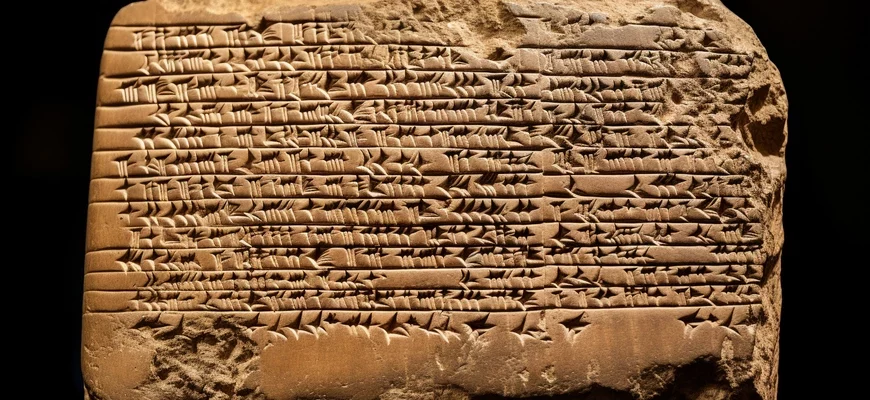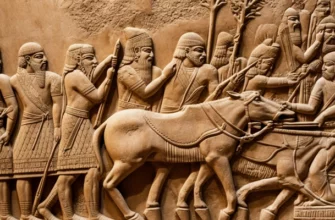The Sumerians (23rd-18th centuries BC) were one of the first civilizations of humanity in the territory of modern Iraq, and they developed a fairly advanced system of law and governance, which included laws, courts, administrative bodies, and a tax system.
Sumerian laws were known as the “Laws of Lagash” and the “Code of Ur” and included rules governing property, inheritance, marriage, crimes, and punishments. In addition, a system of arbitration was developed to resolve civil cases between parties.
The Sumerian judicial system consisted of two levels: local courts, which dealt with minor civil cases and crimes, and a central court, which dealt with more serious criminal cases and appeals from local courts. Judges were selected from among intelligent and decisive citizens.
Sumerian government was organized on the principle of local self-government. Each city had its own ruler, who headed the administrative body responsible for collecting taxes, managing urban infrastructure, and maintaining public order.
The Sumerians also believed that power should be limited by laws and distributed among different governing bodies. For example, city councils consisted of representatives of various professions and population groups, which ensured equal representation of the community’s interests.
Overall, the legal activities of the Sumerians were advanced for their time, as they already contained some principles of the legal system that are still used in more modern legal systems. For example, the principle of separation of powers and the limitation of power by laws is the basis of many modern constitutions.
Also, the arbitration system used by the Sumerians to resolve civil cases is still in use today. The Sumerian judicial system was also advanced in terms of the independence of judges and their selection from among intelligent and decisive citizens, which is also considered an important principle of the modern legal system.
In addition, the Sumerians were the first to develop a writing system, which allowed them to record their laws and other documents. This made it possible to preserve and pass on legal knowledge from generation to generation, which is also an important principle of the legal system.
Thus, the legal activities of the Sumerians were quite advanced for their time and contained principles that are still used in more modern legal systems.
Historical context of the Sumerian legal system
The Sumerians were one of the first civilizations to develop in the Euphrates River valley in modern-day Iraq about 4,000 years ago. Sumerian civilization was known for its achievements in architecture, art, science, writing, and other areas of life.
In terms of the legal system, the Sumerian civilization was one of the first to develop written laws. The laws were written on clay tablets and contained rules governing relations between people, property, inheritance, marriage, criminal responsibility, and other aspects of life.
Sumerian laws were very carefully crafted and were recognized as generally accepted norms for the entire population. Violations often led to serious consequences, including fines, criminal liability, and even the death penalty.
One of the most famous Sumerian laws is the Code of Hammurabi, which was issued in the 18th century BC. The code contained more than 200 laws and was aimed at ensuring public decency and protecting the weaker segments of the population.
The Sumerian legal system was quite complex and detailed, but at the same time it was an important step in the development of law in the world. Many of the ideas and principles established by the Sumerians are still used in the legal systems of various countries around the world.
Sumerian law: structure and basic principles
The Sumerians were one of the first civilizations to develop written laws. Sumerian law was recorded on clay tablets, which were kept in temples and other special places for storing documents. The main principles of Sumerian law were:
Equality before the law: the laws were universally accepted and regulated relations between all people, regardless of their status or social position.
Compensation: the laws recognized the right to compensation for those who were harmed or suffered from the actions of others.
Damages: The laws provided for compensation for those who had been deprived of property or possessions through the actions of others.
Severe criminal penalties: Sumerian laws provided for severe criminal penalties for those who broke the law.
Protection of vulnerable groups: The laws contained provisions that protected the rights of vulnerable groups, including women, children, and slaves.
The structure of Sumerian law was quite complex and detailed. The laws were divided into different categories that regulated different aspects of life. For example, some laws defined the rules for marriage and divorce, others established rules of property, and still others defined the rules for criminal liability.
One of the most famous Sumerian laws is the Code of Hammurabi, which contained more than 200 laws and defined the legal norms of procedure for regulating various aspects of life. The Code of Hammurabi was adopted in Babylonia around 1754 BC and reflected the rules that authorities and citizens had to follow.
The Code of Hammurabi contained provisions on marriage, children, inheritance, property, contracts, crimes, and punishments. One of the most famous laws of the Code of Hammurabi was the principle of “an eye for an eye, a tooth for a tooth.” This principle stipulated that the punishment for a crime should be proportional to the damage caused. For example, if someone killed another person, they could also be killed.
Sumerian law was quite advanced and influential on the further development of legislation. Many of its principles and approaches to law can be found in the legislation of ancient civilizations such as Babylonian, Hittite, and Egyptian.
Sumerian legal practice: dispute resolution and criminal cases
The Sumerians had a highly developed and complex legal practice. Special bodies, such as courts and arbitration commissions, were created to resolve disputes and criminal cases. Judges and arbitrators were independent and had high status in society. They resolved disputes in accordance with the laws and principles of justice established by legislation.
Sumerian judicial practice often used procedures that were similar to modern judicial procedures. For example, before a case was heard, the parties could enter into agreements and agree on evidence. There were also time limits for hearing cases and mechanisms for appealing decisions.
In criminal cases, the Sumerians adhered to the principle of “presumption of innocence,” which meant that the accused must be given every opportunity to defend themselves and prove their innocence. In addition, crimes and punishments for them were clearly defined by law, which contributed to transparency and fairness in the judicial process.
In general, Sumerian legal practice was aimed at ensuring equality before the law, protecting the rights and interests of citizens, and ensuring order and stability in society.
Application of Sumerian laws in practice: examples and analysis.
Sumerian laws were applied in various areas of life, such as property, marriage, inheritance, trade, and criminal justice. Here are some examples of the application of Sumerian laws in practice:
Property: Sumerian laws established rules regarding ownership of land and property. For example, the “Law on Land Lease” stipulated that land could only be leased by written agreement, and the lessee had the right to use the land only for the purposes specified in the agreement.
Marriage: Sumerian laws established rules regarding marriage and divorce. For example, the “Divorce Law” stipulated that if a husband wished to divorce his wife, he had to be open about the reason for the divorce and return her property to her. If a wife wished to divorce her husband, she had to return his property to him.
Inheritance: Sumerian laws established rules regarding the inheritance of property and the division of estates. For example, the “Law of Estate Division” stipulated that an estate must be divided equally among all heirs, and if the estate consisted of property, it must be distributed among the heirs in accordance with their rights.
Trade: Sumerian laws established rules for trade and relations between sellers and buyers. For example, the “Law on the Sale of Goods” stipulated that if a seller sold goods of poor quality, the buyer had the right to return the goods and demand a refund or receive other goods in their place. There were also laws that regulated the responsibility of the seller and buyer for late delivery of goods or failure to fulfill the terms of the agreement.
Criminal justice: Sumerian laws established rules regarding criminal responsibility and punishment. For example, the “Law on Theft” stipulated that if someone stole property, they had to return the property and pay a fine, which depended on the value of the stolen property. If they could not return the property, it could be sold, and the proceeds used to cover the cost of the fine and return the property to the owner. Other laws established liability for insulting honor and dignity, violence, and robbery.
The application of Sumerian laws in practice ensured order and law and order in society. They established clear rules and norms of behavior for all citizens, ensuring their safety and the protection of their property and rights. In addition, Sumerian laws were the first in the world to recognize the principle of “innocent until proven guilty,” which became a fundamental principle of modern criminal justice.
The impact of the Sumerian legal system on the further development of law.
The Sumerian legal system is of great importance for the further development of law and legal systems in human history. Here are some of the consequences it had for the further development of law:
For the first time in the world, written laws were created, which became the basis for the further development of law. Sumerian laws were an important milestone in the history of law, giving impetus to the creation of written laws in other civilizations.
The Sumerian legal system introduced the principle of “innocent until proven guilty,” which became a fundamental principle of criminal justice. This principle protects the rights and freedoms of citizens from excessive power by authorities and ensures fair criminal proceedings.
The Sumerian legal system also introduced the principle of equality before the law, which became the basis for most legal systems in the world. This principle means that all citizens must be equal before the law and have equal access to the courts.
The Sumerian legal system recognized property and contract rights. These principles became the basis for the development of trade and entrepreneurship, which in turn ensured the economic development of civilization.
Sumerian laws also introduced the principles of liability and compensation for damages, which became the basis of civil law. These principles ensured compensation for damages caused to others and protected the rights and interests of citizens.
Overall, the Sumerian legal system is of great importance for the further development of law, as the principles and laws it introduced became the basis for the further development of legal systems around the world. Many of these principles and laws are still used today in various countries.
For example, the principle of “innocent until proven guilty” is a fundamental principle of many modern legal systems, including European and American ones. Many countries also use the principle of equality before the law, which was introduced in Sumer.
Sumerian laws also served as an example for the further development of legal systems around the world. Many countries, such as Britain and the United States, use the so-called “common law system,” which is based on written laws and court decisions. This system was developed on the basis of the Sumerian legal system.
In addition, Sumerian laws also became the basis for the development of entrepreneurship and trade. The principles of property and contract introduced in Sumer became the basis for the development of commerce and entrepreneurship in most countries of the world.
Thus, the Sumerian legal system is of great importance for the development of law and legal systems around the world. The laws and principles introduced in Sumer played an important role in the creation and development of the law that is still used today.








